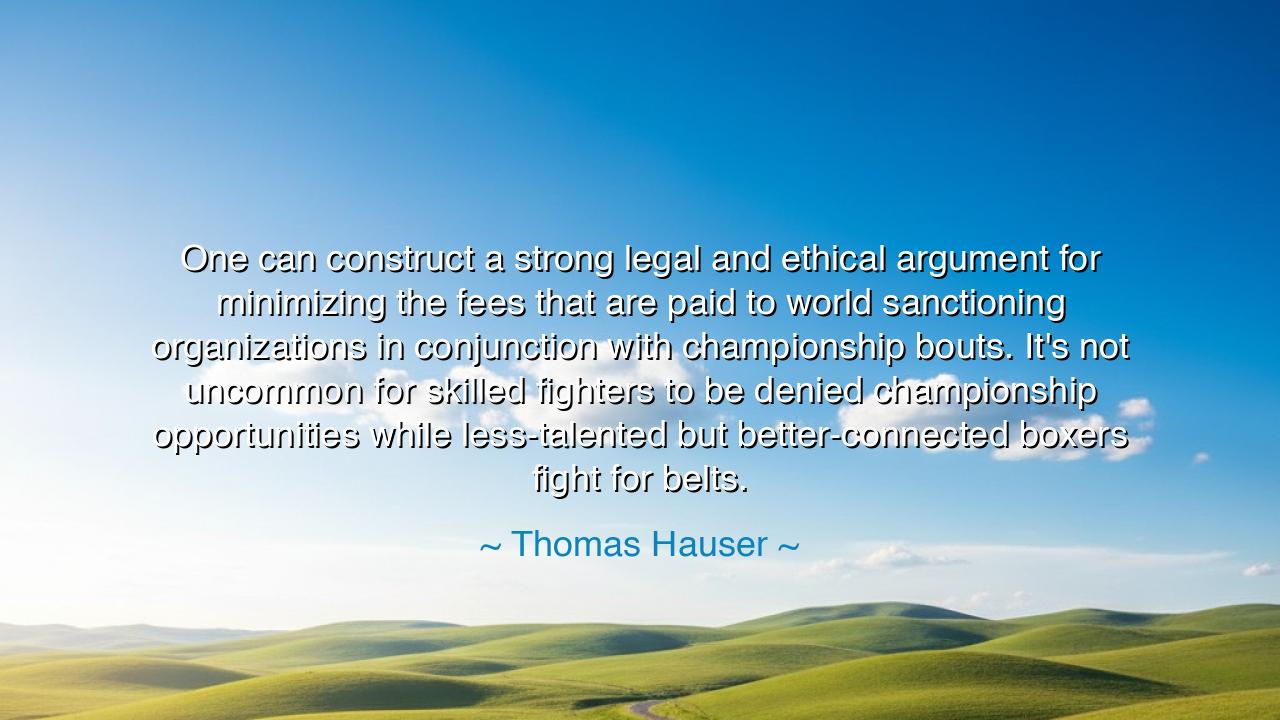
One can construct a strong legal and ethical argument for
One can construct a strong legal and ethical argument for minimizing the fees that are paid to world sanctioning organizations in conjunction with championship bouts. It's not uncommon for skilled fighters to be denied championship opportunities while less-talented but better-connected boxers fight for belts.






The wise Thomas Hauser, chronicler of the sweet science, speaks with the authority of one who has peered into the hidden chambers of power when he declares: “One can construct a strong legal and ethical argument for minimizing the fees that are paid to world sanctioning organizations in conjunction with championship bouts. It's not uncommon for skilled fighters to be denied championship opportunities while less-talented but better-connected boxers fight for belts.” These words cut through illusion like a blade, revealing that the battlefield of boxing is not only waged in the ring, but also in the shadows—where money, connections, and politics may strike harder than any fist.
In ancient times, champions were crowned not by fees or contracts but by the blood they spilled and the valor they displayed. The Greek pankratiast or the Roman gladiator rose or fell by the strength of his limbs and the courage of his heart. But in our modern age, the warrior is often bound by invisible chains: the sanctioning organizations, demanding tribute in the form of heavy fees, wield the power to grant or withhold the glittering prize of a title belt. Thus, the righteous struggle is corrupted, and the most skilled fighters, who should stand as heroes before the crowd, may be cast aside while the chosen of wealth and influence seize glory unearned.
Hauser’s lament is not abstract but rooted in the painful history of the sport. Recall the story of George Chuvalo, the Canadian heavyweight who fought valiantly against legends like Muhammad Ali, Joe Frazier, and George Foreman. Chuvalo, granite-jawed and indomitable, never once fell to the canvas in ninety-three professional fights. Yet, despite his skill and endurance, he was long denied a legitimate chance to hold a championship belt. Others, less tested and less deserving, were lifted into title fights through the favors of promoters and the payments to sanctioning bodies. Chuvalo’s struggle embodies Hauser’s truth: talent alone does not always open the gates of honor.
In this imbalance we see the danger of a corrupted order. When better-connected boxers leap ahead of their worth, the sport itself is wounded. The fans, who hunger for contests of true merit, are deceived; the fighters, who train in sweat and sacrifice, are robbed of destiny; and the spirit of the warrior, which should soar freely, is shackled to the greed of institutions. Thus, the call to minimize fees is more than a cry against financial burden—it is a demand to restore fairness, to lift merit above manipulation, and to honor the sacred bond between fighter and fight.
Let us not forget that this lesson echoes far beyond boxing. In every field of human striving—whether art, work, or politics—the deserving are often overlooked, while those who flatter power ascend. It is an ancient injustice, older than empire itself. Yet the wise know that to expose corruption, to refuse to feed it, is a noble act. Just as the ancients sought to reform their courts and councils, so must we reform our games and our institutions, lest truth itself be strangled by profit.
What, then, shall be the lesson for those who listen? First, recognize that titles, prizes, and recognition are not always the true measure of greatness. The world may crown the unworthy, but history remembers the ones who fought with honor. Second, let your support, your money, and your voice be guided by justice. Do not be deceived by glittering belts or hollow crowns. Instead, raise up the worthy, speak for the silenced, and champion those whose struggle is honest.
Practical wisdom flows from this: if you are a fighter, whether in the ring or in life, do not measure yourself solely by the trophies granted by flawed institutions. Measure yourself by your courage, your endurance, and your fidelity to truth. If you are a spectator, a supporter, or a citizen, do not strengthen the hand of corruption by feeding it unquestioningly. Demand fairness, honor merit, and give your loyalty only where it is deserved.
Thus, let the teaching of Hauser echo like a drumbeat in your heart: the true belt is not of leather and gold, but of integrity and valor. Fees may buy titles, connections may grant chances, but no power on earth can purchase the respect earned by one who fights with honor. This, children of the future, is the crown that never tarnishes, the championship that cannot be denied.






AAdministratorAdministrator
Welcome, honored guests. Please leave a comment, we will respond soon